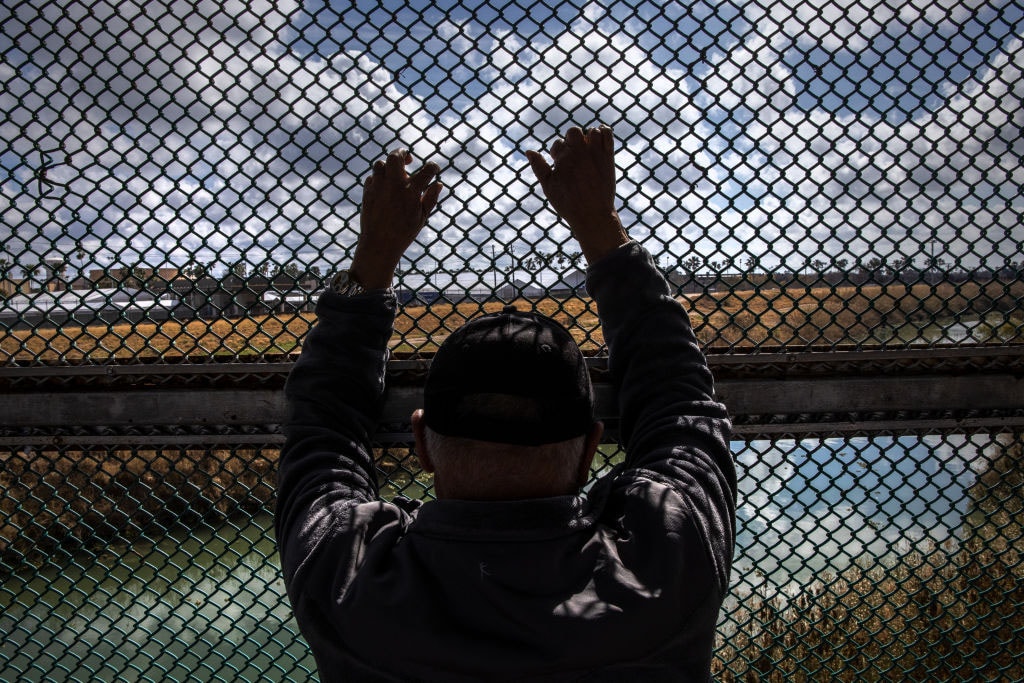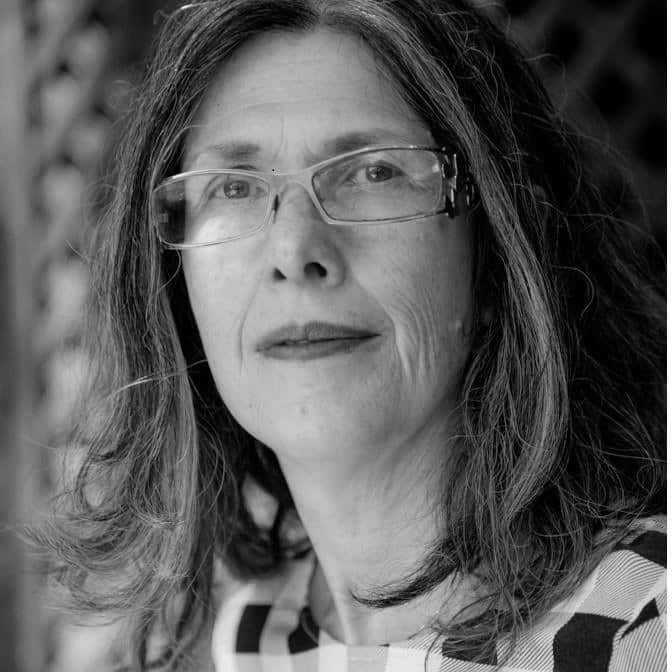 A man looks upon the Rio Grande while waiting to show his immigration documents to U.S. immigration officers at the U.S.-Mexico border crossing on February 23, 2021 in Matamoros, Mexico. (Photo by John Moore/Getty Images)
A man looks upon the Rio Grande while waiting to show his immigration documents to U.S. immigration officers at the U.S.-Mexico border crossing on February 23, 2021 in Matamoros, Mexico. (Photo by John Moore/Getty Images) On Purim, Jews all over the world will hear Megillat Esther, our story of triumph over those who would erase us. The Megillah is a story of diaspora Jews within the ancient Persian empire who were attacked because they preserved their identity and religion — even while being active participants in society.
We read of a demagogue seeking to destroy the Jews using rhetoric about dual loyalty. Haman, the genocidaire, says to the Persian King Ahasuerus, “We have among us a people which is scattered and dispersed among the peoples in every province of your kingdom, and their laws are different from those of all other peoples, and the laws of the king, they do not observe. And it is not wise for the king to bear with them.” (Esther 3:8) Haman is lying; although the Jews do observe their tradition, they are also subject to the laws of the realm. Haman singles out the Jews because Mordechai, a prominent Jew, refuses to bow down to him, citing his tradition. Injured pride turns to hatred, and Haman promises the king a hefty donation to his treasury in exchange for permission to organize a pogrom against all the Jews in the empire.
On Shabbat Zachor, the Shabbat before Purim, we read from the Torah about Amalek, the first force which attacked the Hebrew slaves as they fled from Pharaoh. Our tradition associates Amalek with every would-be destroyer we encounter in each generation, with Cossacks and Nazis — and with Haman.
Haman/Amalek experiences human difference as an unconscionable affront rather than the wonderful manifestation of our Maker’s infinite creativity that we know it to be. Our tradition instructs, “When a person stamps several coins with one seal, they are all similar to each other. But the supreme Sovereign of Sovereigns, the Holy Blessed One, stamped all people with the seal of the Adam the first person…and not one of them is exactly like another.” (Mishnah Sanhedrin 4:5) Amalek despises cultural and religious minorities and seeks to erase them.
American Jews encountered Amalek in the twentieth century when immigration laws were changed to prevent an influx of refugees from cultures other than the “Nordic” — just in time to cut off pathways of escape as the Nazis rose to power. In fact, in 1928, Hitler approved of how the 1924 Immigration Act excluded from the United States “strangers of the blood,” writing that:
The capacity of assimilation for the American Union has given out…with regard to the Chinese…People feel this clearly and know it and for that reason they would most prefer to exclude these foreign bodies from immigration… That the American Union feels itself to be a Nordic-German…is also revealed by the apportionment of immigration quotas among the European [peoples]. Scandinavians, then Englishmen and finally Germans have been accorded the largest contingent. Latins and Slavs receive very little, and the Japanese and Chinese are groups that one would prefer to exclude entirely.
The infamous Breckinridge Long, assistant secretary of state under President Franklin Roosevelt during World War II, wrote, “We can delay and effectively stop for a temporary period of indefinite length the number of immigrants into the United States. We could do this by simply advising our consuls to put every obstacle in the way and to require additional evidence and to resort to various administrative devices which would postpone and postpone and postpone the granting of the visas.” Jews were considered by many to be a force for cultural disruption at best and a disloyal fifth column at worst.
It comes as no surprise, then, that so many American Jews have turned to immigration justice activism, inspired by our Torah and our history. During the previous four years, when families were separated, children were caged and women fleeing domestic abuse were denied asylum, it is no wonder that Jewish organizations like Bend the Arc and HIAS rose up to protect the rights and security of immigrants to the United States. All of us who are not indigenous to this land have family immigration stories, be they of Jews fleeing Spanish Inquisition (only to find that it followed them, even as they allowed themselves to be implicated in colonial projects), or Ashkenazi refugees from pogroms or the Shoah, or African ancestors who were taken here by force or Iranian Jews who fled their country.
It comes as no surprise that so many American Jews have turned to immigration justice activism.
As HIAS, formerly the Hebrew Immigrant Aid Society, founded originally to help Jews immigrate to the United States, declares on its website, “We understand better than anyone that hatred, bigotry, and xenophobia must be expressly prohibited in domestic and international law and that the right of persecuted people to seek and enjoy refugee status must be maintained. And because the right to refuge is a universal human right, HIAS is now dedicated to providing welcome, safety, and freedom to refugees of all faiths and ethnicities from all over the world.” As HIAS explains, “We used to help immigrants because they were Jews. Now we help immigrants because we are Jews.”
This Purim, as a new administration begins to evaluate its immigration policy, we still feel obliged to continue our work, including supporting the Biden administration when it creates paths to citizenship and applying pressure to close the detention centers and stop summary deportations. The Purim story of successful resistance is there to inspire us. As Mordechai says to Esther, the hero of the story who risks her life to defend her people, “And who knows if you have not attained your position for just this moment.”
Rabbi Robin Podolsky serves on the Board of Governors for the Sandra Caplan Community Bet Din, writes at shondaland.com and jewishjournal.com, advises the Jewish Student Union at Occidental College and serves as writing facilitator and dramaturg for Queerwise, a spoken word and writing group. She also serves on the National Ritual Committee for Bend the Arc.























 More news and opinions than at a Shabbat dinner, right in your inbox.
More news and opinions than at a Shabbat dinner, right in your inbox.